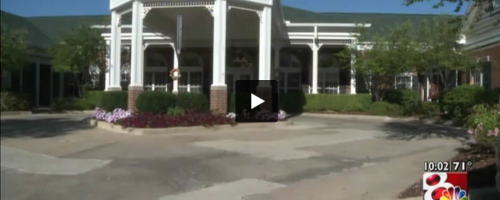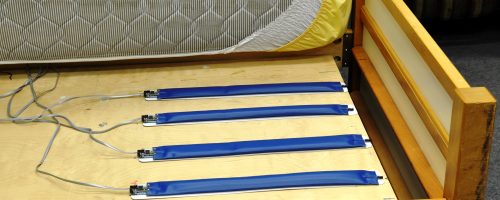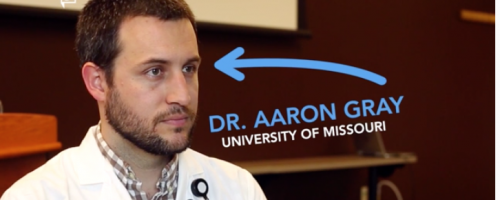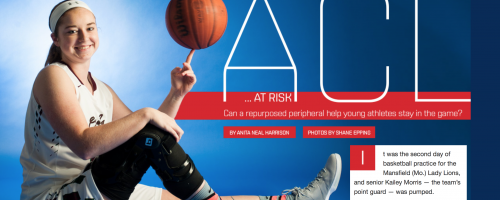Mizzou has become the fifth university to join the Center to Stream Healthcare in Place (C2SHIP), a National Science Foundation (NSF) consortium focused on helping patients monitor and manage their health at home. Marjorie Skubic, a Curators’ Distinguished Professor in electrical engineering and computer science, along with co-principal investigators, were awarded NSF funding to lead […]
In the News
Bill Janes awarded $760,000 grant to advance ALS research and intervention
The Department of Defense awarded Bill Janes, assistant professor in the Department of Occupational Therapy, a two-year $760,000 grant, alongside his collaborators at the University of Missouri, to advance ALS prevention and early intervention. This interdisciplinary project will combine an in-home sensor system, wearable smartwatch and electronic medical records to predict health outcomes for people […]
Skubic and team awarded patent for hydraulic bed sensors
There are a lot of companies making bed sensors that monitor your health while you sleep. Curators’ Distinguished Professor Marjorie Skubic not only made one, she’s also tried a lot of them. The crowded market is one reason it took more than a decade for Skubic to patent the one she and her team designed. […]
Stroke care is being reshaped with new technology
In a world of fast-paced technology and innovative recovery plans for patients, Rachel Proffitt saw an opportunity. From her occupational therapy work among a range of demographics, she noticed that patients responded better to programs that were not only individualized but also entertaining. Link to full article
Home-based medical sensors are extending seniors’ independence
Beverley Lake, 84, has a one-bedroom apartment in TigerPlace,
an intermediate care senior community where her health is monitored around the
clock. But she never notices.
Reshaping rehab recovery
More than $3 million in NIH grants will help assess, monitor patients recovering from stroke
Linda K. Anderson and Kari Lane, Applied Nursing Research, https://doi.org/10.1016/j.apnr.2019.151190
Linda K. Anderson and Kari Lane, Applied Nursing Research, https://doi.org/10.1016/j.apnr.2019.151190Download PDF
Interview with Marge Skubic at the Global Telehealth Conference 2016
Marge Skubic speaks more about Squaring the Life Curve of Supportive Technology, her presentation at the Global Telehealth Conference in New Zealand. Listen to full interview.
MU Researchers Invent System for Predicting Falls in the Elderly
Falls send nearly three million older Americans to the hospital each year. Their injuries, ranging from broken hips to brain trauma, cost $31 billion to treat. For many, it’s the end of their independence. But what if you could predict someone is going to fall and intervene? It’s happening in Columbia.
Sensor Systems Identify Senior Citizens at Risk of Falling Within Three Weeks
Each year, millions of people—especially those 65 and older—fall. Such falls can be serious, leading to broken bones, head injuries, hospitalizations or even death. Now, researchers from the Sinclair School of Nursing and the College of Engineering at the University of Missouri found that sensors that measure in-home gait speed and stride length can predict likely falls.
Research Finds Effectiveness Of Radar And Bed Sensors To Help Keep Seniors Safe
Two new mHealth programs funded by the National Science Foundation and recently profiled in the Journal of Ambient Intelligence and Smart Environments are part of a decade-long initiative by the University of Missouri to use technology to help seniors age in place. The new projects are using two different types of mobility sensors in order to monitor elderly patients for tending health concerns.
MU Technology Helps Detect Early Signs of Risks for Seniors

COLUMBIA – Two MU studies demonstrate using non-invasive and non-contact sensors with the ability to capture early signs of health changes or problems for aged people. The bed sensors capture data on heart rate, respiration rate, and overall cardiac activity, and the radar monitors walking speed.
Radar and Sensors Flag Health Trouble for Seniors

Two new studies show how monitoring walking speed with radar and heart health with bed sensors can help maintain older adults’ health and warn of impeding issues. “In-home sensors have the ability to capture early signs of health changes before older adults recognize problems themselves,” says Marjorie Skubic, professor of electrical and computer engineering in the University of Missouri College of Engineering and director of the Center for Eldercare and Rehabilitation Technology.
Radar, Bed Sensors Help Health Providers Detect Problems Early
COLUMBIA, Mo. – Developing and evaluating motion-capture technology to help older adults “age in place” has been the focus of researchers at the University of Missouri for more than a decade. Previous research has utilized video game technology and various web-cameras to detect health changes in Tiger Place residents. Now, two new studies demonstrate how monitoring walking speed using radar and heart health by utilizing bed sensors help maintain older adults’ health and warn of impeding issues.
Aging in Place Critical for Seniors to Remain Independent
COLUMBIA, Mo. – Quality of care in nursing homes has long been under scrutiny of the public and government regulators. Under this microscope, how can nurses improve quality of care in nursing homes? That question has laid the research foundation for Marilyn Rantz, Curators’ Professor Emerita of Nursing in the Sinclair School of Nursing at the University of Missouri. Over the past 30 years, Rantz has established herself as a premier international expert in quality measurement in nursing homes and research programs to improve quality of care of older people. Through her research she has found that nurses, coordinated care and technology all play pivotal roles in improving patient care and lowering health care costs for aging populations.
Video Game Technology Is Helping Athletes Prevent Bad Knee Injuries

Dr. Aaron Gray at the University of Missouri wants to use Microsoft Kinect’s motion-sensor technology to detect athletes’ risk of ACL injuries.
ACL at Risk: Can a Repurposed Peripheral Help Young Athletes Stay in the Game?

Identifying the athletes most at risk is the starting point, according to Aaron Gray, an MU School of Medicine assistant professor in the departments of family and community medicine and orthopedic surgery, and Marjorie Skubic, an MU professor of electrical and computer engineering. In the past, screening has been impractical for all but the most elite athletes. Gray and Skubic are changing that with a cheap, widely available gaming peripheral called the Kinect, a motion-sensing device that works with Microsoft’s Xbox.
Video-game Device with Goal of Preventing Patient Falls
Technology used in video games is making its way to hospital rooms, where researchers at the University of Missouri hope to learn new ways to prevent falls among hospital patients.
Home Sensors Enable Seniors to Live Independently
People are living longer and they desire to live as independently as possible in their senior years. But, independent lifestyles come with risks, such as debilitating falls and deteriorating health resulting from inadequate care. To address these issues, researchers are developing “smart home” technologies to enhance the safety of residents and monitor their health conditions using sensors and other devices
MU Researchers Use New Video Gaming Technology to Detect Illness, Prevent Falls in Older Adults
COLUMBIA, Mo. -Many older adults lose their independence as their health declines and they are compelled to move into assisted care facilities. Researchers at the University of Missouri and TigerPlace, an independent living community, have been using motion-sensing technology to monitor changes in residents’ health for several years. Now, researchers have found that two devices commonly used for video gaming and security systems are effective in detecting the early onset of illness and fall risk in seniors.
MU Sinclair School of Nursing Interdisciplinary Projects Receive Top Honors from the American Academy of Nursing
The American Academy of Nursing (AAN) annually selects research/projects that highlight major innovations in the field of nursing and improve the health care profession overall. Last month, two MU Sinclair School of Nursing interdisciplinary projects, TigerPlace and Aging-In-Place, received the AAN’s Edge Runner awards and they are now being used as national examples.
Marilyn Rantz Keynote
Marilyn Rantz delivered a keynote address: “Built for the Future: TigerPlace” at the National Gerontological Nursing Association 20th Annual Convention, Myrtle Beach, South Carolina.
Sensing Change (poster)
MU researchers need TigerPlace residents to fine tune technologies that can keep them and seniors throughout the country independent and active.
MU College of Engineering, School of Nursing, School of Medicine receive $1.2 million NSF ITR grant
MU College of Engineering (CoE) researchers have received a $1.2 million National Science Foundation grant to pursue technology they hope will not only help monitor but also prevent accidents among the elderly. The research team started work in December 2004 on developing software that will integrate information provided by monitoring systems into a meaningful pattern and alert caregivers to a senior’s current and impending needs.
MU Works on Technology to Increase Independence and Safety for Seniors
COLUMBIA, Mo. —A senior in a long-term care facility gets up in the middle of the night, trips and falls, and is unable to get up or call for help. Minutes later, a staff member arrives to check on the resident after being alerted by special vibration sensors in the resident’s room that had detected the fall.
